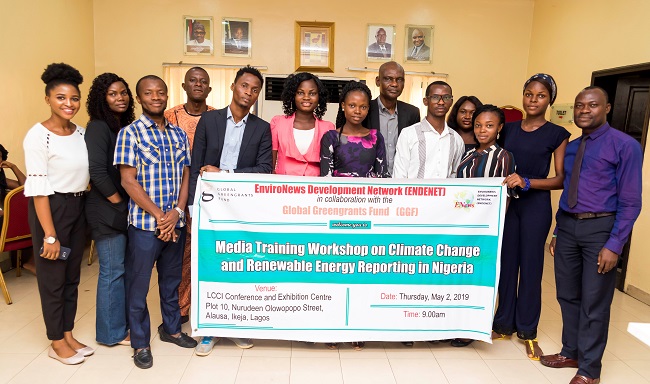A not-for-profit outfit, the Lagos-based EnviroNews Development Network (ENDENET), in collaboration with an international public charity, Global Greengrants Fund, has deepened the knowledge of 12 journalists on climate change and renewable energy reporting.

Michael Simire, Director, ENDENET, disclosed that the 12 journalists were chosen from various media for the training, which held in Lagos on Thursday, May 2, 2019.
Simire said that the training was to draw attention to the need for the use of clean and renewable energy, to mitigate the causes of climate change in the country.
He noted that to achieve this, awareness should be improved to ensure that messages are effectively communicated to policymakers and the people, to take up actions to protect the environment.
“Nigeria is one of the countries in the world experiencing the effects of climate change due to global warming.
“The high level of the country’s release of CO2 from domestic and industrial use of electricity generating sets and automobile engines is worsening the situation.
“The aim of the training is to increase the knowledge of journalists on climate change and alternative sources of energy, and to increase frequency of reportage of climate change and renewable energy in the Nigerian media,’’ he said.
“We want to explore strategies for improving climate change and renewable energy reporting as well as examine challenges facing environmental issues and hope to explore opportunities for birthing a network of journalists reporting climate change and renewable energy,” Simire added.
One of the facilitators, Chike Chikwendu, said that Nigeria was vulnerable to climate change impact due to its dependence on income generated from production and consumption of fossil fuel.
Chikwendu, who is the Executive Director, Centre for Energy and Environmental Sustainability (CEES), urged the Federal Government to respond to climate change issues through creation of appropriate policy, as well as a legal and institutional framework.
He urged further that government should mainstream climate change into development planning and process and ensure adequate financing and funding of climate change initiatives.
Chikwendu said that individual response to climate change should include promoting green economy through reduction, recycling and reuse; plant trees, use paper on both sides and avoid printing digital documents.
Other individual responses, he said, include using pool cars to work and leisure, and switching off lights when not in use.
Another facilitator, Prince Lekan Fadina, Executive Director, Centre for Investment, Sustainable Development, Management and Environment (CISME), said that global warming and climate change have been the subject of political, social and development controversies.
“Economic damages from weather-related disasters in Nigeria and globally climbed to near-record levels in the middle of 2018 with over 900 major events worldwide causing an estimated $200 billion in losses.
“Companies, their shareholders, governments, employees and society must be really concerned about increasing costs, both human and material,’’ Fadina said.
He urged the participants to leverage the knowledge acquired from the training to educate the public on the challenges and opportunities of climate change and the need to efficiently manage the environment.
“We are trustees for future generations and custodians of God’s resources.
“We must proceed to build a world that is more equitable and freer, more sustainable, respectful of nature, more inclusive, supportive and within the United Nations Education for Sustainable Development Initiative,’’ Fadina said.
Fadina, who later performed the official launch of EnviroNews, an online environment and development medium, urged participants to explore various angles of climate change and renewable energy and report them appropriately.
“I wish to appeal to the journalists to use the knowledge acquired from this programme to educate our people on the challenges and opportunities of climate change and the need to efficiently manage our environment. We are trustees for the future generations and custodians of God’s resources. We must proceed to build a world that is more equitable and freer, more sustainable, respectful of nature, more inclusive, supportive and within the United Nations Education for Sustainable Development Initiative,” he said.
On his part, Mr Philip Jakpor, Media and Campaigns Director, Environmental Rights Action/Friends of the Earth Nigeria (FoEN), said that climate change issue was intensified in Nigeria due to gas flaring from extractive activities, current industrial model, and indiscriminate tree felling.
He noted that the issues resulted into flooding, drying of Lake Chad, desert encroachment and rising sea level, among others.
Jakpor, therefore, advised journalists to visit environmental flashpoints, put human faces to issues, obtain and simplify data, and to always ask probing questions to enrich their reporting.
Journalist and Head of Training with the Voice of Nigeria (VON), Ugonma Cokey, while training the journalists, charged them to consider journalism as their career and put in much effort to drive change through their reports.
At the end of the training, participants were paired with mentors to guide them on writing stories on climate change and renewable energy.
By Oluwafunke Ishola
